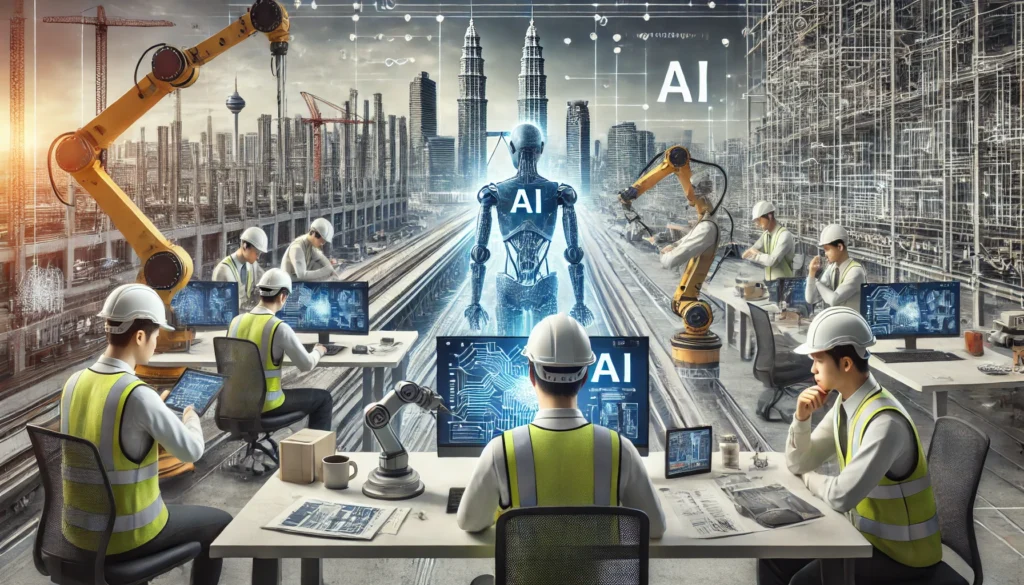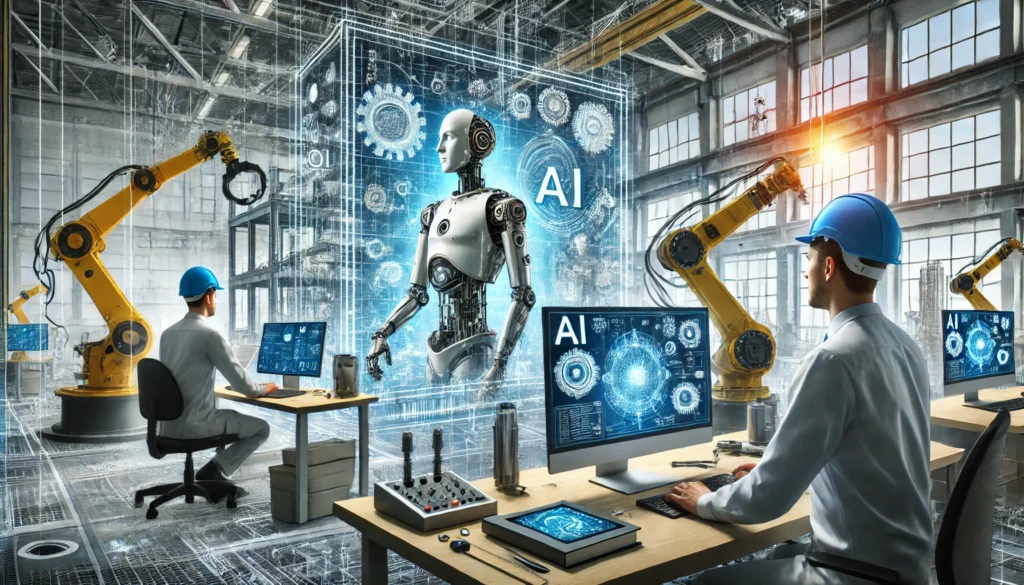Introduction
Artificial Intelligence (AI) is revolutionizing industries worldwide, and Malaysia is embracing this technology to enhance its engineering landscape. AI’s integration into various engineering fields has boosted productivity, sustainability, and efficiency. Malaysia’s government has been at the forefront, encouraging AI development through initiatives, partnerships, and infrastructure projects. This blog explores the role of AI in engineering, the government’s efforts, and how global trends are shaping Malaysia’s future in AI-driven solutions.
Government’s Role in AI for Engineering in Malaysia
The Malaysian government has taken a proactive approach to integrating AI into the country’s industries, especially engineering. Initiatives like MyDIGITAL and the Malaysia Artificial Intelligence Roadmap (AIRmap) aim to embed AI into key sectors like construction, energy, and manufacturing. The establishment of the Faculty of AI at Universiti Teknologi Malaysia (UTM) highlights the focus on education and skill development, ensuring that engineers are equipped with modern AI tools and techniques.
MIDA (Malaysian Investment Development Authority) plays a critical role in promoting AI adoption across industries. By fostering partnerships between the government, private sectors, and academic institutions, Malaysia is pushing AI integration into construction projects, smart city initiatives, and sustainable urban planning. Through programs like AI for Rakyat, the government aims to make AI accessible to all, ensuring technological growth benefits every segment of society.
AI’s Impact on Different Engineering Disciplines in Malaysia
1. Civil Engineering
AI is revolutionizing civil engineering by optimizing design processes and improving infrastructure maintenance. Predictive maintenance systems powered by AI can analyze sensor data from structures like bridges and highways to identify potential problems before they occur. This proactive approach saves time and resources. AI simulations also help engineers make efficient use of resources, ensuring that buildings and infrastructure projects are cost-effective and environmentally friendly.
2. Mechanical Engineering
In mechanical engineering, AI is transforming manufacturing and robotics. AI-powered robots now perform complex tasks autonomously, increasing productivity while reducing errors. Predictive analytics also enhance machinery maintenance, allowing engineers to identify and resolve issues before breakdowns occur. These technologies have drastically improved the efficiency of manufacturing processes and reduced operational costs.
3. Electrical and Electronics Engineering
AI is playing a vital role in optimizing smart grids and energy management systems. Electrical engineers use AI algorithms to manage electricity distribution efficiently, reducing waste and ensuring stable power supplies. Additionally, AI is central to innovations in autonomous vehicles and telecommunications, helping electrical engineers design smarter, more efficient systems.
4. Environmental Engineering
Environmental engineers use AI to promote sustainability in their projects. AI-powered tools help monitor water resources, predict weather patterns, and manage waste disposal efficiently. This technology enables engineers to design infrastructure with minimal environmental impact, making it easier to meet sustainability goals in large-scale projects.
Global Trends in AI for Engineering
AI’s global influence on engineering is undeniable. Several trends are pushing AI to the forefront of innovation:
- Generative AI in Design: Generative AI is transforming design processes across engineering disciplines. Engineers now use AI to simulate multiple design scenarios, helping them choose the most cost-effective and resource-efficient options.
- AI-Powered Robotics: Robotics driven by AI is reshaping industries like healthcare, automotive, and manufacturing. AI robots can now handle tasks that previously required human intervention, improving precision and productivity.
- Open-Source AI: Open-source AI models are becoming more prevalent, allowing smaller firms to adopt AI without needing expensive infrastructure. This democratizes AI, enabling wider usage in industries like construction and logistics.
- AI in Sustainability: AI is being used globally to address environmental challenges. Engineers use AI to optimize energy consumption, reduce carbon emissions, and improve the sustainability of urban infrastructure projects.
- Data-Centric AI: The focus on data governance is growing in the engineering sector. AI helps manage and analyze large datasets, improving project outcomes and enhancing decision-making.

AI Engineering Salary and Career Prospects in Malaysia
As AI becomes more integrated into engineering, the demand for skilled AI professionals is rising. AI engineers, data scientists, and machine learning specialists are in high demand, especially in industries like construction, telecommunications, and renewable energy.
- AI Engineers: RM 5,000 to RM 7,000 per month for entry-level, with experienced professionals earning up to RM 15,000 or more.
- Machine Learning Engineers: RM 6,000 to RM 12,000 per month.
- AI Project Managers: Senior positions can exceed RM 15,000 per month.
With AI reshaping multiple industries, these professionals will continue to be in high demand as companies strive to adopt AI-driven solutions.
AI’s Role in Sustainable Engineering
AI is becoming a crucial tool in promoting sustainability across engineering fields. Energy management is one of the most significant applications of AI, with AI-powered systems monitoring and optimizing energy consumption in buildings and factories. Smart grids powered by AI help reduce electricity waste and integrate renewable energy sources efficiently into the national grid.
Resource optimization is another area where AI is making a difference. In construction, AI algorithms help reduce waste by identifying the most efficient methods for using materials. This is crucial for green building projects that focus on minimizing the environmental impact of construction activities.
In the context of climate resilience, AI-powered systems are used in flood management, especially in Malaysia, which is prone to extreme weather. These systems analyze data to forecast floods and manage water resources effectively, reducing risks to infrastructure and communities. AI also plays a role in developing a circular economy by improving waste management systems, ensuring more materials are recycled rather than discarded.
Case Studies: AI in Engineering Projects in Malaysia
1. Kuala Lumpur Smart City Initiative
One of the most successful AI-driven projects in Malaysia is the Kuala Lumpur Smart City initiative. AI technology optimizes urban services such as traffic management, energy consumption, and waste collection. AI-powered traffic management systems reduce congestion, improving air quality and fuel efficiency. Additionally, AI enhances public safety by monitoring and analyzing real-time data from security cameras.
2. East Coast Rail Link (ECRL)
The East Coast Rail Link (ECRL) is a significant infrastructure project where AI is being used to optimize construction processes. AI-driven tools help monitor project timelines, resource usage, and environmental impacts, ensuring the project runs efficiently while meeting environmental standards. AI simulations help minimize the environmental footprint by identifying sustainable construction practices.
3. Smart Water Management Systems
AI systems play a pivotal role in water resource management across Malaysia. These systems help optimize dam operations and predict water shortages, ensuring more efficient use of water resources. AI’s predictive capabilities also aid in flood prevention by monitoring rainfall data and adjusting operations accordingly.
4. Renewable Energy Projects
AI is integral to Malaysia’s renewable energy sector, particularly in solar and wind energy projects. AI tools help predict energy output and optimize the placement of solar panels and wind turbines, ensuring maximum efficiency in energy generation. This technology also helps balance supply and demand, ensuring renewable energy is integrated seamlessly into the grid.
Challenges and Future Prospects for AI in Engineering
1. Talent Development and Upskilling
One of the biggest challenges for Malaysia is the AI skills gap. Programs like the Digital Skills Training Directory are helping to upskill engineers and prepare them for AI-driven roles. As AI continues to transform industries, it is critical that Malaysia develops a workforce capable of harnessing these technologies.
2. Ethical AI and Data Privacy
As AI becomes more pervasive in engineering projects, data privacy and ethical concerns are growing. The Personal Data Protection Act (PDPA) ensures that AI technologies are implemented responsibly, particularly in sectors that handle sensitive information, such as healthcare and finance.
3. Future Prospects
The future of AI in engineering looks promising, with Malaysia’s government investing heavily in AI infrastructure and research. AI is expected to contribute significantly to the country’s economy by 2025, with applications across all major engineering sectors driving innovation and sustainability.
Conclusion
AI is rapidly transforming engineering in Malaysia, from infrastructure development to environmental sustainability. With the government’s strong support and growing global influence, Malaysia is positioning itself as a hub for AI-driven innovation in Southeast Asia. Engineers who embrace AI technologies are better equipped to tackle future challenges and contribute to the country’s continued growth.
As AI adoption increases, Malaysia is set to lead in the development of sustainable, efficient, and innovative engineering solutions, enhancing both the local economy and the global engineering landscape.


